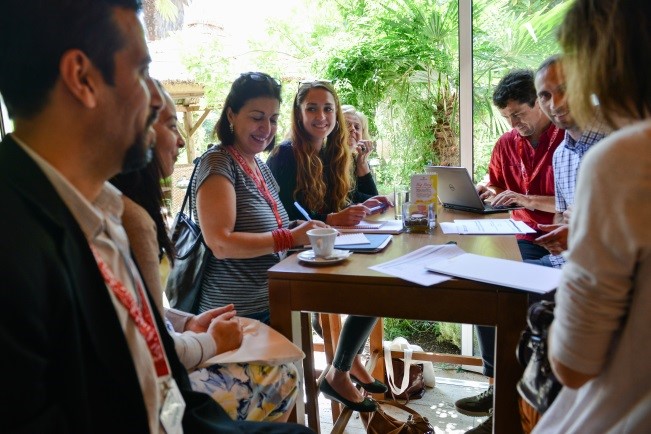July 2016 / Aurélie Schwarb, Academic Intern, Western Balkan Division, Swiss Department for Development and Cooperation (SDC)
 On an Advisor initiative and with the support of IDS, a learning process began in April 2015 at the Bucharest seminar on Roma Inclusion. Two learning trajectories proposed by Nonprofit Organisations (NPOs) in charge of this theme were set up on different topics: Discrimination and Women's Empowerment.
On an Advisor initiative and with the support of IDS, a learning process began in April 2015 at the Bucharest seminar on Roma Inclusion. Two learning trajectories proposed by Nonprofit Organisations (NPOs) in charge of this theme were set up on different topics: Discrimination and Women's Empowerment.
The idea was to share experiences and knowledge through documents, discussions between peers, interviews and reflection on field visits. "When we visit communities, we get a lot of information that we can't digest immediately. In order to learn, we need to analyse and reflect on what we have experienced and been exposed to shortly after the visit. In most of the cases we are flooded by other tasks and don't take time for this. Being part of a learning trajectory forces you to step back and dive into what you have learnt from the experience:
discussions and exchanges with peers adds further insights", said Laurent Ruedin, advisor and member of the 'Women's Empowerment' learning trajectory.
The major goals of this learning process were to broaden the understanding of each subject and to understand the intermediaries' role. To achieve this, the groups met seven times, via Lync, between October 2015 and May 2016.
The Women's Empowerment learning trajectory helped its members to have a better understanding of how power is operating to perpetuate discrimination amongst Roma women. Considering that Roma women are confronted with different forms of discrimination - in the Roma family, Roma community and in broader society - identifying and reflecting on the intersecting inequalities and power relationships, as well as on model interventions, contributes to providing a new perspective which could help improve action in this field.
For instance, a lack of gender focus was identified in much NGO work with Roma people. Despite their struggle for empowerment, NGOs often only engaged with Roma women as 'mothers', which paradoxically led to the replication of discrimination. But women were often leaders in Roma community organisations, active in advocacy and acted as catalysts for other improvements in Roma inclusion. Moreover, the learning group found that women's empowerment also depends on a change in the attitudes of men. Therefore, in order to transform the unequal power relationship, it was of key importance to work with both.
The learning process was judged as very positive by the members of the groups. They deemed it extremely valuable to be able to have a reflection session aloud with peers, especially after a field visit. The experience holder was deepening her/his learning through communicating the experience which was also useful to the others at the same time. Moreover, these exchanges are particularly enriching when participants are confronted with different contexts and realities.
Nevertheless, only a few people took part in the groups. However, the situation improved: during the third social inclusion seminar in Tirana, new members subscribed and other learning trajectories were created.
If you would like further details, please click on these links to have the complete summary of the two learning trajectories:
 Women's Empowerment
Women's Empowerment
 Discrimination
Discrimination
